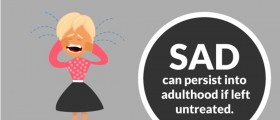After the birth of my son which was last year, he always seemed annoyed and unhappy. When I consult the doctor regarding this, they told me it is due to Reactive Attachment Disorder. When I searched on the internet for some information regarding it, I got scared. Can anyone help me in explaining to me that is this disease is something that I should be worried about? Because I am very worried about my son.
Loading...
Hello, guest.
Reactive Attachment Disorder (RAD) can certainly be a concerning diagnosis for any parent, but understanding the condition and how it can be managed is key to supporting your child effectively. Here's a breakdown of what RAD is, what it means for your son, and how you can help him.
- What is RAD?
- RAD is a rare but serious condition in which an infant or young child doesn't establish healthy attachments with their parents or caregivers. This is usually due to severe early neglect or mistreatment.
-
Causes:
- RAD often develops due to a lack of basic emotional needs for comfort, affection, and nurturing during early childhood. It's important to note that it's not caused by typical parenting mistakes but rather extreme circumstances.
-
Symptoms:
- Children with RAD may seem consistently unhappy, irritable, or fearful, even in comforting situations. They might not seek comfort from their parents or resist comforting efforts.
RAD can affect a child's ability to develop healthy relationships and emotional connections with others.
Children with RAD might have difficulty calming down, show aggression, or have a hard time with social interactions.
Treatment and Management
Early intervention is crucial. Treatment usually involves a combination of therapy, counseling, and parenting education. A child psychologist or psychiatrist specializing in attachment disorders can provide guidance.
The role of the parent or primary caregiver is crucial in the treatment of RAD. Consistency, patience, and providing a stable, nurturing environment are key.
Specific therapeutic approaches, like attachment-based therapy, can be beneficial. These therapies focus on strengthening the attachment between the child and the caregiver.
Joining a support group for parents of children with RAD can provide additional support and resources.
What You Can Do-
Stay Informed:
- Learn as much as you can about RAD. Understanding the disorder will help you become more effective in helping your child.
-
Consistent and Nurturing Care:
- Provide a stable, loving, and predictable environment for your child. Consistency in caregiving is key to building trust and attachment.
-
Work with Professionals:
- Collaborate closely with healthcare providers and therapists. They can offer specific strategies and interventions tailored to your child's needs.
-
Self-Care:
- Caring for a child with RAD can be challenging. It’s important to also take care of your own emotional and physical well-being.
-
Patience and Understanding:
- Progress with RAD can be slow and requires patience. Celebrate small victories and understand that setbacks can happen.
While RAD is a serious condition, with the right treatment and support, children with RAD can develop healthier attachment styles and relationships. It's essential to work closely with healthcare professionals and to remember that you're not alone in this journey. Many parents have navigated this challenging condition and have found ways to support their child's emotional growth and development.
Loading...
It's essential to work closely with healthcare professionals, therapists, and specialists who can provide guidance and support. Early intervention and appropriate therapeutic techniques can significantly improve outcomes for children with RAD. Your commitment to understanding and addressing your son's needs, along with professional assistance, can make a positive impact on his well-being.
Remember that every child is unique, and with the right care and support, many children with RAD can develop secure attachments and lead fulfilling lives. Don't hesitate to seek advice from healthcare professionals and connect with support networks to navigate this challenging journey. MamaAdoption is here to offer insights and support as you navigate your parenting journey.
Loading...
















